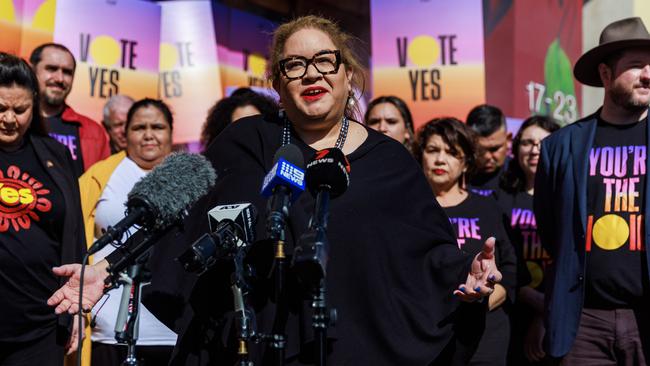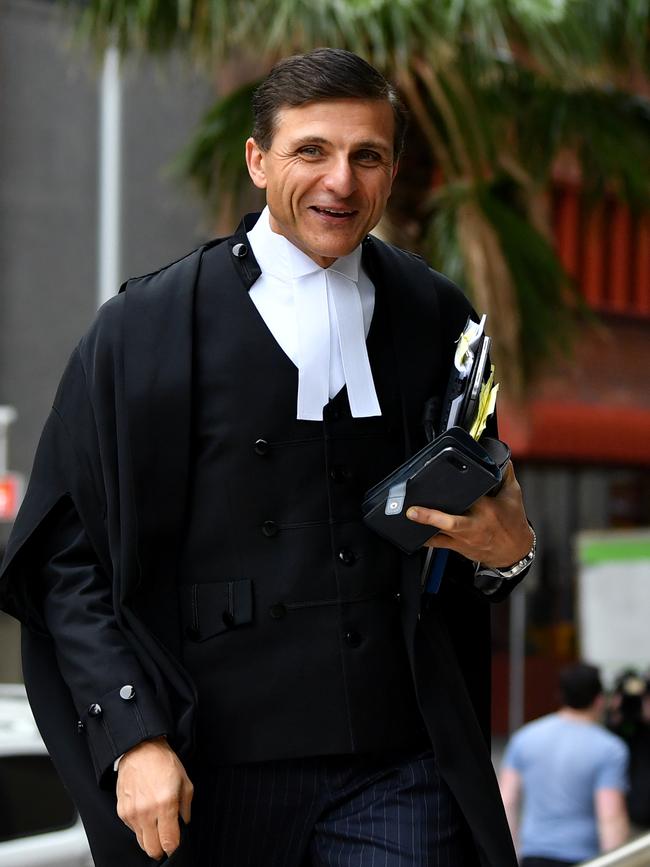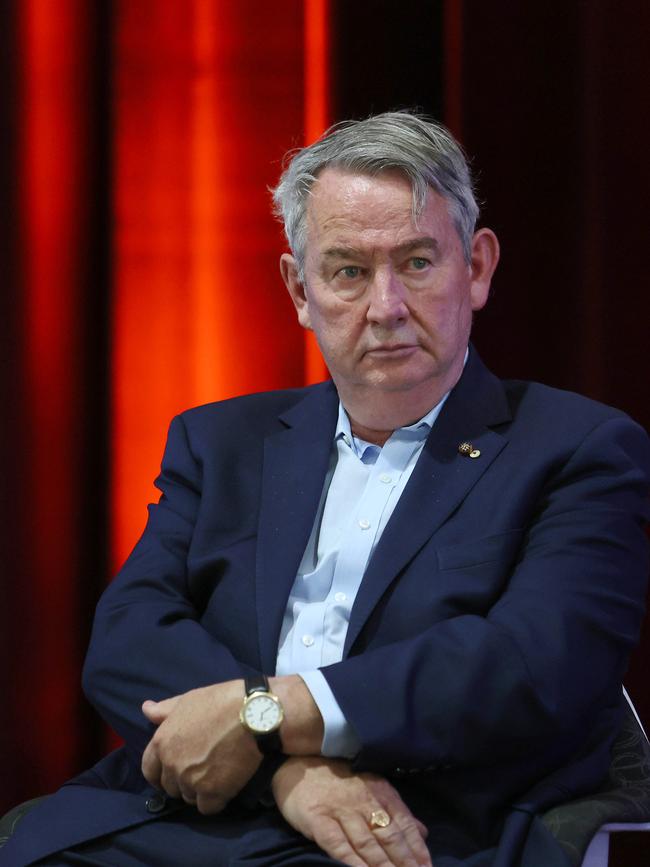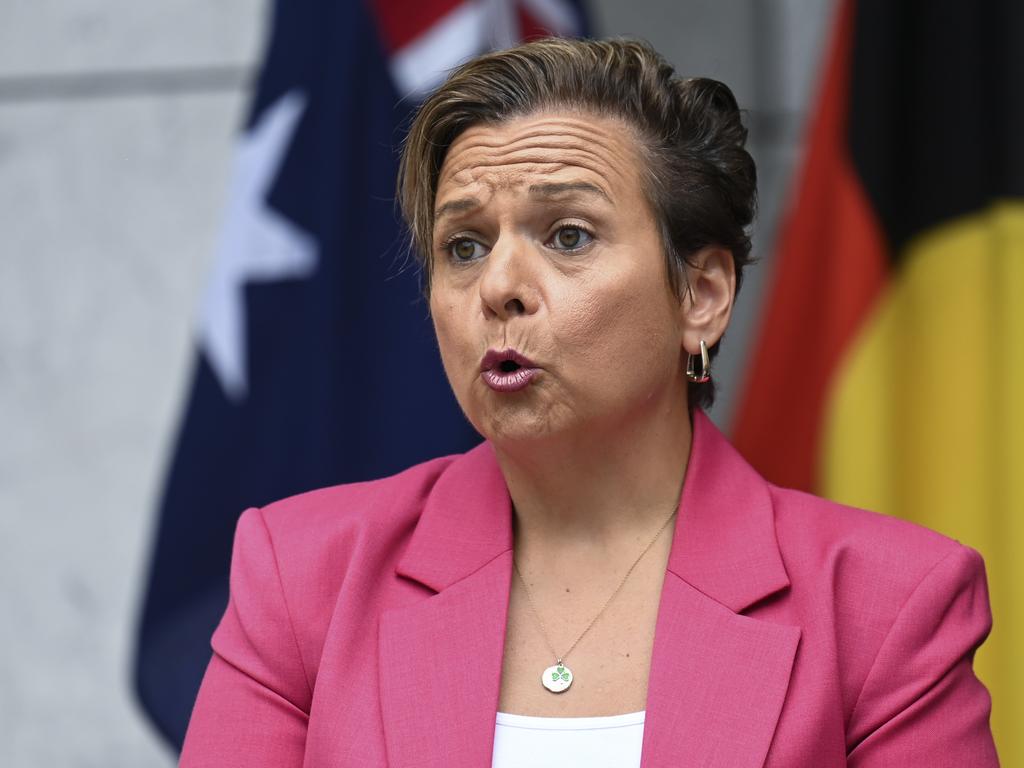
The latest evidence is voice architect Megan Davis’s declaration that last year’s referendum would have passed but for “Trumpian lies and distortions” that these misinformation laws would have stopped.
Then there’s the government’s own explanatory memorandum to the bill that states “content falling within this (misinformation or disinformation) category might include false, misleading or deceptive information about electoral candidates or referendum proposals which … could have the effect of denying Australians the right to … informed choice”.
The government’s official impact analysis of the bill says “some examples of gendered misinformation and disinformation are … spreading false information … to undermine and reverse the rights of … LGBTIQ+ people by implying that these rights are coming at the expense of other groups”. So, what seems self-evident to the Albanese government would be enough, for instance, to ban from social media almost everything JK Rowling has said defending the rights of biological women.
It seems that a Prime Minister who has never recovered his mojo after the defeat of his signature project now wants to make it much harder for his opponents to make their case.
One of the most sinister aspects of this new censorship is its selectivity. The prohibitions on information that’s deemed to be intentionally or unintentionally false or harmful won’t apply to the statements of government or the reports of media organisations, most of which lean to the left.
But because they will apply to everything else that’s posted on social media, something that was once thought to herald a new era of free speech, where all individuals had a platform from which to make themselves heard, will instead become a giant echo chamber for whatever views the new censors deem acceptable.
One of the turning points in the voice debate was the Freedom of Information release showing that the Uluru Statement from the Heart was not just the simple one-page document that the Prime Minister characterised as a gracious invitation to all Australians to walk together down the path of reconciliation.
In fact, as FOI revealed, the Uluru statement was a 26-page log of claims against the Australian people based on a long recitation of alleged systemic injustice culminating in claims for reparations for which the one-page version was little more than a cover note.
At the time this was exposed, Davis claimed this was deliberate misinformation, even though she’d earlier accepted, on several occasions, that “the Uluru Statement from the Heart is occasionally mistaken as merely a one-page document” but actually “includes a lengthy narrative called Our Story”.

For almost six years, since its official release in May 2017, Davis attested to the length and breadth of the Uluru statement in numerous speeches, interviews and written articles, until its wide-ranging scope became an impediment to the success of the voice.
So, she and others tried to recant what was so comprehensibly on the public record and Facebook joined their side, labelling my broadcasts about the real demands in the full Uluru statement as “false information” and forcing users to read a disclaimer before watching them. As well, for weeks Facebook restricted the reach of the entire Sky News Australia page as a punitive response.
Showing a measure of integrity, even the ABC’s Media Watch took issue with Facebook’s “false” label, saying “given that there may be some point in what Credlin is saying, we think a ‘disputed’ label would be more appropriate”.
And as post-voice analysis by the Institute of Public Affairs showed, 187 fact-checking articles related to the voice were published between May 22, 2022, and October 14 last year (via AAP FactCheck, RMIT FactLab and RMIT ABC Fact Check), of which 91 per cent (170 fact checks) assessed claims made by opponents of the voice (the No case) whereas only 9 per cent (17 fact checks) assessed claims made by proponents of the voice (the Yes case).
In addition to its interference in last year’s voice debate, Big Tech has actively connived with government agencies here and overseas to suppress politically damaging claims about the Hunter Biden laptop and to suppress pandemic dissidents’ claims about the efficacy of masks and vaccines and the origin of the Wuhan virus.
Should the government’s misinformation bill pass, Big Tech’s existing censorship would go into overdrive given official invigilation, through the Australian Communications and Media Authority, backed up with the threat of massive fines.

This new censorship would be bad enough if the facts really were clear about pressing issues such as climate change, the best way to respond to pandemics or constitutional change to favour the descendants of Australia’s original inhabitants.
But given that the facts are so much in dispute and what constitutes argument in good faith is so contested, any official regime to crack down on debate would be a modern form of heresy hunting in the hands of secular inquisitors.
Clearly, the government wants to reinforce Big Tech’s existing leftist predilections by imposing additional “media literacy” requirements while being able to say to critics that the actual censorship process is out of its hands.
This is an extraordinary attack on the free speech that’s essential to a functioning democracy, including the right to say things that might be mistaken, ill-judged, impolite or even harmful – given that these are nearly always subjective judgments – and that what’s thought to be wrong today could turn out to be right tomorrow.
Even prominent voice supporters are worried the misinformation bill would stifle democracy if it’s passed. Greg Craven, a Yes campaign insider, says the main Yes advocates habitually “would characterise any contrary argument as misinformation or disinformation” that “should effectively be banned from the referendum”.

Arthur Moses SC, another Yes supporter, says Labor’s bill would shut down “legitimate expressions of opinion” and could be “weaponised to shut down debate on matters of public importance”.
It would be a big mistake to allow public disquiet about the potential downside of social media, especially parental anxiety about its impact on impressionable and vulnerable teenagers, to be harnessed in ways that suppress free speech. And it is no coincidence that Labor is running these issues concurrently to assist in that conflation.
A year on, the voice vote should be celebrated as a resurgence of our democracy rather than a justification for suppressing it on the grounds that people are too easily misled and that voters are supposedly incapable of working out for themselves what’s true and what’s false.
In defeating the Prime Minister’s voice, everyday Australians actually found theirs; the “silent majority” was silent no more. Perhaps that’s why Anthony Albanese is now so eager to silence everything on social media that Big Tech thinks his government wouldn’t like.







Make no mistake, the federal government’s Combatting Misinformation and Disinformation Bill – which it wants to ram through the parliament in time for the next election – is a dagger aimed at the heart of our democracy.